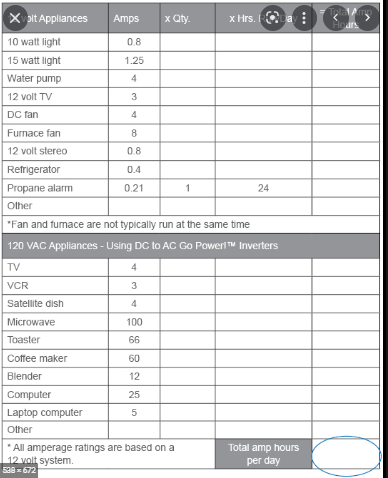cully
Well-known member
following. Great thread.
OOOOH...a liberrry!!! I'm an avid reader so that's of great interest to me!

That makes sense. I have a Bluetti Portable EB150 with two 100W hard frame panels with LONG cables but being able to use short cables would be a real benefit. I keep the Bluetti inside when I put the panels out. Maybe put those two hard frame panels on the roof and get the more portable panels to put in the sun. Thanks for your help!

You're welcome! A bit late and off-topic, but take a look at the WINs (Wandering Individuals Network). They organize groups who travel the country, finding free and inexpensive places to stay for a few days to a week at a time. They find interesting things to do at each location, then travel an hour or two down the road to their next stop. You can enter or leave a group at any time. They have a group that will be staying on the beach at Puerto Penasco (Rocky Point) in December, a circuit wandering through Arizona for the winter and another one touring Florida before resuming their full activities in the spring. An interesting alternative to sitting in one or more LTVAs for the winter.Excellent information...thank you so much!
Hi Mark, is there anyone here in Albuquerque you would recommend? I’m looking to buy a solar kit online, and would like to find someone to help install it. Thanks!Where? Or where would you be willing to go? Do you know what you need it to do?
Mark B.
Albuquerque, NM
You might want to contact 1 or 2 of the local mobile RV techs and talk with them about this.I’m looking to buy a solar kit online, and would like to find someone to help install it. Thanks!
>>- I estimate that I will expect to use around 8 kWh per 24 hour timespan at 12v. I need, at minimum, a 2100 Ah @ 12v battery bank (3 days storage to be safe)... this is why I intend to use a 48v system - that's a 550 Ah @ 48v battery bank (rounding up to account for conversion loss and loss due to cabling length as this is still a rough estimate).<<
Wow! That's a lot of battery. Have you sourced brands? Where will they be stored?
i've been researching this as well as I intend to be boondocking a fair amount.
my plan is to get a multimeter w/ a clamp so I can measure the energy usage of the AC appliances I plan on keeping (electronics mostly) - that will give me a baseline for AC usage per hour, relatively easy to calculate the hours of expected use, conversion from DC and loss of the cables & inverter/charger (probably a few Ah/day). Then add that value + whatever the expected DC load is for 12v appliances (fridge, water pump, lights, USB ports, etc), as those are all well documented. the end result is amp hours for a day. multiply by 3 or 4 days to have a good leeway if the panels get damaged or something and I need to bug out and go find shore power...
so, once I know the estimated amp hours needed per day, then I can size the solar panel array to provide that much power generation to make up for what I "spend" each day. Once that's been done, then I need to see what solar panels I can get that will either meet/exceed that variable AND can fit on the vehicle's roof. If the panels needed exceeds the size available on the roof then I need to reduce my AC load (AC is not as efficient as DC power). so maybe rinse/repeat that process a few times.
- currently, I'm thinking 5x panels x whatever Amphours x up to 5 hours of direct sunlight per day.
once that has been figured out, then I need to buy the rest of the equipment. All equipment needs to be fused - either in-line fuses or fuses at the battery and at the breaker/fuse box. electricity can be dangerous - possibly life threatening if you dont treat it with respect. other equipment needed (not an exhaustive list, I'm still researching this myself):
- fuses
- solar charge controller than can handle the maximum VoC produced by the solar panel array (with a 15% error margin)
- battery bank w/ bms & whatever other safety features I need
- shunt on the negative terminal of the battery for monitoring
- inverter charger (pure sine wave inverter converts DC to AC / charger for shore power)
- fuses (reiterating, they're important)
- stepdown/buck converter to reduce the battery voltage to the appliance voltage (as I will be using a 48v system)
- bus bars, fuse blocks (AC circuits and DC circuits)
- marine grade stranded wire/cabling, lugs/mc4 connectors, etc (stranded wire is more resistant to shocks, solid core wire will eventually short out and cause a fire in the walls). you can make your own cabling but I will be buying mine pre-made because I have enough tools.
here's my tentative calculations:
- I estimate that I will expect to use around 8 kWh per 24 hour timespan at 12v. I need, at minimum, a 2100 Ah @ 12v battery bank (3 days storage to be safe)... this is why I intend to use a 48v system - that's a 550 Ah @ 48v battery bank (rounding up to account for conversion loss and loss due to cabling length as this is still a rough estimate).
- 8 kWh/day = 5 hours direct sunlight x 5 panels x 320watts per panel... and 320 isnt very big. more is better in this situation as long as the solar charge controller can handle the total voltage (VoC). I think I can fit 5x 375w panels - that's 9.37 kWh, or around 110 extra Ah generated every 5 hour day.
complicated? yeah, it is. look at the math, do the calculations that are going to work for your use case - and good luck!
He said 8 KwH per day (24 hours), not 8000 watts/hr.I estimate that I will expect to use around 8 kWh per 24 hour timespan at 12v.
you seem to be a little confused with "8KW/hr at 12V then state you are using a 48V system..
your talking about Watts per hour, the battery voltage isn't important in this context.
take a look at my post from a few years back, it's biased for lead acid but you can multiply the battery requirement by 0.75 for lithium..
ballpark for 8000 W/hr is around 2400 PV Watts.. for 5 Days autonomy approx 38 KW/hrs that's a lot for an RV
are you sure about 8000W/hr.. ?
SEE HERE
For this Canadian, it would be no snow, I suspect I could tolerate quite a bit to have zero snow - probably wont get there but who knows- I might! -smileHere in New Mexico there is ample dirt and wind, but I'm in a city with electricity and running water. Out there you'd better like solitude because it's dirt as far as they eye can see. I can understand how some folks would like it depending what you're into, but it needs to be more than just cheap rent.
Mark B.
Albuquerque, NM
If someone has say a $2000 a month house pint, add maintenance, upkeep then it does save money. I’d sell my p,ace, use equity to buy deeded rv lot in the Ga. Mtns. Especially one with a full carport type cover with a nice deck the length of the 5th wheel under cover. Most for under a grand a yr pays for sewer and water, you only pay electric.I find it humorous when someone wants to live in an RV to save money.
If someone has say a $2000 a month house pint, add maintenance, upkeep then it does save money. I’d sell my p,ace, use equity to buy deeded rv lot in the Ga. Mtns. Especially one with a full carport type cover with a nice deck the length of the 5th wheel under cover. Most for under a grand a yr pays for sewer and water, you only pay electric.
I have never heard of anyone doing that. It is the people that come here looking to buy a dirt cheap RV and go live in desert that think they will be saving money. People who own a very expensive house don't buy a dirt cheap RV. If someone sells their expensive California house can pay the mortgage off, pay the capitol gains tax, pay the realtor, and pay to have a mover move all their stuff can come to Florida and buy a really large beautiful house and still put a few thousand into the bank.If someone has say a $2000 a month house pint, add maintenance, upkeep then it does save money. I’d sell my p,ace, use equity to buy deeded rv lot in the Ga. Mtns. Especially one with a full carport type cover with a nice deck the length of the 5th wheel under cover. Most for under a grand a yr pays for sewer and water, you only pay electric.
